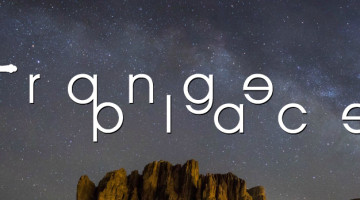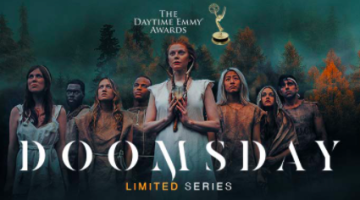In today’s outrageously crowded streaming video marketplace, finding a quality episodic web series has always been like trying to find a needle in a haystack. While there are plenty of viewing options (both good and bad) being presented on sites like Youtube, Vimeo, Netflix, Hulu, Amazon Prime and a few others, the sheer amount of different platforms for viewers to watch their favorite web series makes trying to keep up with them incredibly difficult.
For anyone who’s ever wanted to have a one stop shop to access the shows they like, as well as their favorite kinds of shows, they’ve now got one in the new web series aggregator Stareable. Gathering both indie and studio produced series from a wide range of sources (producers, fans and media sites like Snobby Robot), Stareable’s site gives viewers an easy to use interface that helps them find the shows they want to watch – without all the complicated guesswork.
Founded by its CEO, Ajay Kishore, Stareable is unlike any site online that’s currently devoted to hosting web series, and its benefits for fans and filmmakers alike are just as significant. While viewers can find their favorite shows by genre, distributor and keywords, content creators can benefit from having their content featured prominently on the platform, including through its partnerships with several web series festivals.
At the same time, Stareable treats all of its shows equally, without preference to viewership, content or popularity, which gives filmmakers and fans alike a level playing field. More content is being added every day thanks to contributions from show creators and viewers, who can contact Kishore personally at [email protected] to send their suggestions for new shows to be featured on the site. Kishore discusses these features, how Stareable came to be created, its strong sense of community, and much more, in the following interview.

On Stareable’s web site, visitors see a visual menu of some of its varied and diverse original web series content, aggregated from a host of different streaming platforms, studios and indie producers.
What, or who, inspired you to create Stareable?
Kishore: About a year ago, I stumbled across a Time Out New York article about the Top 50 web series right now, and it occurred to me that it’s a little bit surprising that that this sort of information wasn’t more readily accessible.
Admittedly, I hadn’t spent a lot of time focused on independent television, but I do love television, and I love being kept aware of the interesting things that are happening within television. So, I started to explore the idea, and (thought) about what that sort of platform could look like. Over time, it’s one of those things where it just slowly, but surely, takes over your life. Then, here we are today.
In what ways does (Stareable) stand out from other web series aggregators, plus other streaming platforms? In what ways is it similar?
Kishore: At the end of the day, I don’t think that we invented the idea of aggregating, or trying to put structure around something that can be pretty opaque and fragmented. I’ve spoken to, at this point, a lot of creators, and a lot of the fans of web series and things like that. What I’ve realized is, for a long time there have been Tumblr pages, and various websites that kept lists of, say, literary themed web series and things like that. Those are basically aggregators. I think what we’re trying to do, and I hope that this is a differentiator, is we’re really trying to build a sense of community.

3 core members of the Stareable team, hard at work. Bottom left: Founder/CEO Ajay Kishore. Center: site front-end developer John Langhauser. Bottom right: visual designer Alex Menglide.
It’s not really driven by, say, my (tastes) or the team’s tastes in what content is good. We want people to embrace the site as their own, and (to) review content as they feel about it, and submit shows to us that they think other people should see.
I think we want it to have this kind of free-wheeling sense to it, that there’s just this huge universe of amazing content that’s out there that’s waiting to be discovered. I think that’s really what we’re hoping to achieve, and (is) what is going to differentiate us.
What services does Stareable provide web series creators and viewers?
Kishore: Creators, I think, are really good at having a story, having a vision, (and) creating the content that they really believe in. They’re not necessarily as focused on putting it in front of an audience, marketing, and really achieving what their content is worth.
Our hope is, if you can do a better job of presenting it to an audience, (and) of making it more findable, then they will be able to get the viewership and recognition that they deserve. Then, from the audience’s perspective, I think what we’re trying to do is (to) create a central place that you can come to, where you can find all of these great contents that’s being created.
One of the things that we’ve realized, and (which) is really core to what we’re trying to achieve, is (that) all this content is really scattered across different platforms. YouTube and Vimeo are the two big ones, but it seems very clear that Facebook really wants to be a video platform. Amazon recently announced what’s essentially a YouTube competitor. It wouldn’t be surprising if another major internet company announced another video platform. Then, you have all this other content that’s being created.
From the fan’s perspective, it’s really frustrating to have to care whether a show lives on YouTube, whether it lives on Vimeo, (or) whether it lives on Facebook. Beyond that, all this great content is scattered in with funny cat videos, and baby videos, and things like that. There’s definitely a place for all of that stuff. It’s great. I watch videos of cats constantly, but when I want to watch a television show ,or a web series or something like that, I don’t want to have to wade through everything else. We’re trying to act as a filter to really only focus on the episodic content that viewers want to find.

One of several dedicated category pages, found within the easy to use design of Stareable’s web site interface.
Besides the plethora of content on Stareable, and the site’s ease of use, what are some of the other ways that viewers will benefit from using the site?
Kishore: Things that are useful about the site are the centralized way in which information is organized. The ability to find reliable user reviews, and the fact that reliably, several times a day, we’re adding content to the site, so it’s never a static thing, there’s always growth, and so there should never be a sense that, “oh, I’ve run out of things to watch on Stareable.”
How can web series creators submit their shows to Stareable, and how can fans make suggestions for shows they like to be featured on the service?
Kishore: We are always looking for submissions and suggestions, so they should email me at [email protected], and we would love to hear from them. I think that’s been one of the great successes that we’ve had. It started out as we were looking for content, listing it, reaching out to creators, and creating that conversation. Now, we’re starting to hear from them. Having them reach out to us and say, “hey, would you be interested in listing our shows?” is really rewarding because it makes it clear that we’re helping out the community, that we’re adding value, (and) that they see a need for what we’re doing. So, that’s been a great part of the experience.
Are there any licensing deals struck with content producers, or is it just free linkage to their content as sent through creators and fans?
Kishore: It’s just free linkage. I think (that) our goal, and the reason why we don’t host the content ourselves, (and why) we don’t produce any content ourselves, is (that) we really want to feel like we are an independent site that doesn’t have any incentives to push a specific type of content, (or) a specific producer of content. We’re happy to redirect you to wherever or what you want to watch. The other nice thing about it is that, as you mentioned, it gets around all of these licensing issues. We aren’t appropriating anyone’s content; we’re just making it more searchable, so no one ever feels like we are crossing any sort of boundaries.
 How can web series creators, including those especially who are independent, not backed by a network or studio, benefit from having their series featured on Stareable?
How can web series creators, including those especially who are independent, not backed by a network or studio, benefit from having their series featured on Stareable?
Kishore: The hope, (and) the value that we provide to content creators is (that) we have an established audience that really cares about independent web series, or independent television, or (however) you want to refer to it. As the shows are listed, they are more discoverable by that audience. Hopefully, that means that that content gets seen by more people, and it’s appreciated by the right people. We’re trying to make the process by which audiences find the content that’s right for them (to be) a little bit more frictionless.
Does the site provide any monetization involved for those creators, or will it do so in the future?
Kishore: In terms of monetization, I think at a certain point, we will have to figure out a revenue model for the site, but that’s pretty far off. Right now, we’re really just focused on building that community, finding out about the content, (and) putting it in front of people. Any sort of monetization would never be at the expense of the creators or the audiences. I think it would be kind of off to the side, just as a way to make the platform sustainable.
Would there be any promotional backing provided to any of the web series featured?
Kishore: We want to advance the creators, and (to) help them put themselves in front of more people. How that looks, I would say, is unclear. We’ve started to partner with a number of web series festivals. We are going to be creating playlists for a handful of web series festivals that we have partnerships with, so that the creators that win those festivals have a spotlight on them on the site.
That’s definitely something that we would like to improve on going forward. (It’s the) same thing with shows that are (getting) great reviews. Maybe there are ways that we can really help surface that content to other users on the site. So, it’s definitely an evolving conversation about, at the end of the day, how can we do a better job of getting the right content in front of the right people? And I think there a lot of answers to that problem.
Which web series festivals are you working with currently, and how can people find the playlists (for those festivals) on Stareable?
Kishore: WebFest Berlin is our first partnership, and then (we’ll be partnering with) web series festivals in Rio and Hamburg. The playlists are for this year’s festivals. The winners haven’t been announced, so they’re not available yet, but they should be, shortly after the festivals conclude.

Stareable’s official Twitter page. Visit it at: www.twitter.com/StareableCo
Will there be any future partnerships with other web series festivals?
Kishore: We’re definitely talking to a number of other festivals. I don’t want to jinx anything, but that’s the hope. One of the things that is really great is this feeling within the web series community (web series festivals; Snobby Robot, Stareable) that we’re kind of on the cusp of this really interesting and burgeoning movement, and so we should all help each other, because we’re all working towards the same goals. That’s been a really great experience, just having those conversations with all the people that really care about what’s happening.
Besides submissions from fans and web series creators, describe some of the other ways that you curate the content on the site.
Kishore: We’re always looking for new shows. We look on the major platforms, we look on Twitter, we look on Facebook. We try and stay abreast of the news in the community about the content that’s being created, about content that’s being funded on IndieGoGo, and some of the other fundraising sites.
Because it speaks to what we’re trying to achieve, it’s very sprawling; there’s a lot happening and there’s no central repository for it. Certainly, we read you guys (Snobby Robot), and that’s super helpful. A lot of the stories that you guys write are about series that I wouldn’t have otherwise heard about, and so that’s been incredibly useful.

Stareable’s official Facebook page. Visit it at: www.facebook.com/stareable
How does Stareable use social media like Facebook and Twitter to help build the content on its site and to interact with viewers and creators?
Kishore: As we add shows, we post them on our feeds, mainly Twitter and Facebook, (with) the hope being that we’re trying to broadcast out all the content that’s being created, and (to) really put it in front of a wider audience.
Similarly, we’re always looking (for) those core creators to try and talk to them about what they’re doing, and to try and find new shows to list. It’s a bit of a push and pull in terms of really trying to understand what’s going on.
In what ways does Stareable benefit audiences/demographics who have been underserved by traditional Hollywood movies and TV?
Kishore: One of the things that I really love about what’s happening with web series is, because it doesn’t go through the traditional Hollywood filter or lens, there are all these subjects and communities that it does a much better job of dealing with. Women, minorities, LGBT, mental health, etc. All these things that you never really see in traditional television (are things) that web series are always trying to tackle, because people want to have their voices heard from those communities. It’s great to see this diversity coming out of those communities.
 SHUGS AND FATS is a great example. There’s no editorial voice, so it’s not us saying, “this show is good, this show is bad.” It’s everyone having the opportunity to rise up, based on the merits of the actual content. That, I think, is the thing that doesn’t really happen in traditional Hollywood, where you don’t really have the ability to see all the failed pilots, all the things that people thought were too niched.
SHUGS AND FATS is a great example. There’s no editorial voice, so it’s not us saying, “this show is good, this show is bad.” It’s everyone having the opportunity to rise up, based on the merits of the actual content. That, I think, is the thing that doesn’t really happen in traditional Hollywood, where you don’t really have the ability to see all the failed pilots, all the things that people thought were too niched.
Here you do, and so being able to enable these niches, or these communities is, I think, really powerful. It’s something where you can feel that, as great content is made, it’s going to circulate, and it’s going to get the recognition that it deserves.
CH: What are your overall hopes for the success of Stareable, going forward?
AK: We think about it as making it easier for our audiences and content creators to basically meet in the middle. And so we just want to continue to improve on the job that we’re doing for both groups, for audiences, making it easier to find great content, making them more aware of what we’re trying to achieve. And for content creators, it’s helping them get the recognition that their content deserves. So, they’re both pretty big problems, and I think we’re pretty excited to tackle them.
ON THE WEB: http://www.stareable.com
FACEBOOK: https://www.facebook.com/stareable
TWITTER: https://twitter.com/stareableco










No Comment